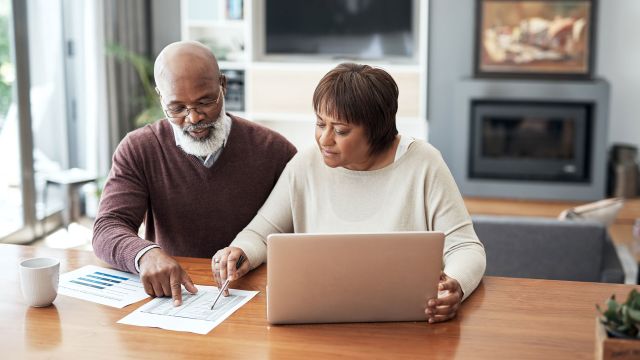Updated on June 17, 2020.
In a perfect world, people in their 60s would be happily using their last decade of employment to plump up both cash reserves and retirement funds.
But the COVID-19 pandemic has slammed workers of all ages, including older adults. In April 2020, 15.7 percent of workers age 65 and over without a disability were unemployed, the highest rate ever for the demographic since record-keeping began in 1948.
It may be tough to get rehired, too. After the 2008 recession, workers age 62 and up were about half as likely to find jobs as those in the 25-to-34 demographic, and they earned significantly less than in their previous jobs.
Granted, many people in their 60s are already comfortably retired. But others can’t afford to be without a job just yet, and pandemic-related unemployment could have a serious impact on their plans for post-work life.
That’s sobering, but it’s probably not the end of the world. Retirement plans shouldn’t be written in stone, according to financial writer Emily Guy Birken.
“A retirement plan is a living creature that you come back to and revise as your situation changes,” says Birken, author of The Five Years Before You Retire and Choose Your Retirement.
“The easiest way to do that is to come at your money with a sense of flexibility and a willingness to roll with the punches,” she adds.
With that in mind, here’s how older adults can navigate financial uncertainty in the months to come.
Use resources wisely
Have you been laid off? If you’re eligible for unemployment benefits, save as much as possible. You’ll need extra cash on hand to cover basic household expenses if joblessness lingers beyond the 39-week benefit period specified in the Coronavirus Aid, Relief, and Economic Security (CARES) Act.
“Basic” means exactly that: food, shelter, utilities and debt service. Start with a financial fire drill to determine monthly expenses. You might be eligible for special deals with regard to credit cards, auto loans and mortgages, so contact your lender to see what’s being offered. Investigate other types of assistance, too. The Benefits.gov website is a good place to start.
A major cash drain for some older adults is the help they give to their children. Across the nation, 59 percent of parents with kids under age 30 are still helping them financially, according to a 2019 survey from the Pew Research Center. Such assistance takes many forms:
- Letting adult children live at home into their 20s or early 30s
- Picking up the tab for health or auto insurance
- Keeping them on family phone plans
- Helping cover financial emergencies or even recurring household expenses like mortgages and utilities
Some older parents even pay for Costco sprees. “I’ve had clients buy extra groceries as a bribe to try to get the kids to come over,” says Certified Financial Planner (CFP) Delia Fernandez of Los Alamitos, California.
It’s natural to want our children to have the best possible lives. But if you’ve been laid off (or think you might be soon), it’s time to get real about what you can truly afford. Otherwise you’re “stealing from your own future,” according to Birken.
“The best gift seniors can give to their kids and grandkids is being financially secure themselves,” she says. “Your kids are not going to thank you when you have to live in their basement.”
Consider reducing your spending, too, to help unemployment benefits and money from other sources (such as a spouse’s job or rental property income) last longer. For now, it’s a good idea to pause your retirement savings to boost your cash reserves. Defer big-ticket expenses, as well. Maybe you’d planned to trade in your still-decent car this year, or to replace some aging furniture. Hold off until you feel like you’re on better financial footing.
Wait on Social Security if you can
If you’ve lost your job and you’re in your early- to mid-60s, you may be tempted to take Social Security benefits earlier than you’d planned.
But keep these facts in mind: About one in three people age 65 today will live until at least 90, and one in seven will live to be 95. That means you could outlive both your retirement account and any cash you’ve set aside.
Social Security, on the other hand, lasts until death. That’s why you should aim for the best possible benefit, if you can wait. Here’s an example from the Social Security website:
- Imagine that your benefit would be $1,000 per month if you retire at 66 years and 8 months.
- You get laid off at 62 and decide to take benefits early. Doing this would reduce your benefit to just $716 a month.
- And if you waited until age 70? The benefit would be $1,266—that’s 77 percent more per month, every month, for the rest of your life.
So, if possible, you should hold out until you’re 70, or at least until full retirement age, which ranges from age 66 for those born from 1943 to 1954 to 67 for those born in 1960 and later.
Know new retirement plan rules
Workers in their 60s saw their retirement investments drop an average of 10.1 percent in the first quarter of 2020, according to NASDAQ.com. Whereas millennials and Generation Xers can still build retirement savings for decades to come, older workers simply don’t have as much time to recoup those kinds of losses.
“You get close to or at retirement and the bottom falls out,” Fernandez says.
Two recent pieces of legislation, however, could give your savings a little more time to grow:
- The required minimum withdrawal (RMD) age used to be 70½; after that you had to take a certain amount from your 401(k) or IRA every year. In late 2019, the Setting Every Community Up for Retirement Enhancement (SECURE) Act changed the RMD age to 72 if you reach 70½ in 2020.
- In addition, the CARES Act eliminated the need to take an RMD in 2020. If you’ve already taken an RMD this year, it might be possible to roll the money back into an individual retirement account if certain conditions are met.
Reducing expenses now and building cash reserves will also buy you some time; the less you have to withdraw from retirement investments, the longer they will last and the more money they may accrue.
Re-imagine retirement
It’s natural for older adults to be worried, or even angry, about their new economic situation, says Ian Bloom, a CFP in Raleigh, North Carolina.
“They had a plan, whether it was written or just in their head, going into retirement. That plan to some degree has changed because of what’s going on in the world,” Bloom says.
If this describes you, give yourself a little time to acknowledge how the pandemic has affected your future. Then start thinking about new ways to make the retirement numbers add up.
“It might be time to start re-imagining retirement for the short term,” says Annelise Bretthauer, a CFP with Kauviara Financial Planning in Hillsboro, Oregon. For example, instead of retiring at 65 you could go part-time for the following few years, or maybe even up until age 70 in order to claim maximum Social Security benefits.
It can be tough for seniors to get rehired, but you could always look for a different kind of employment, including jobs in the gig economy or work you can do from home. Ask trusted friends and family members about their experiences or start researching online. The website SideHusl, for example, vets part-time and self-employment jobs in terms of earning potential.
Note: Another provision of the SECURE Act repealed the maximum age (previously 70½) for contributing to pre-tax individual retirement accounts and allows even part-time workers to contribute to 401(k)s if they’ve worked at least 1,000 hours in a single year or 500 hours yearly for three years straight. So, if you do keep working longer than planned, you can also keep saving for retirement.
Ultimately, the COVID-19 pandemic has changed the way America works, and no one can say how long its impact will last. It might have upset the plans you had in place for retirement. But it is possible to rewrite those plans. This may not be easy, but it’s essential to take charge of your financial future.







